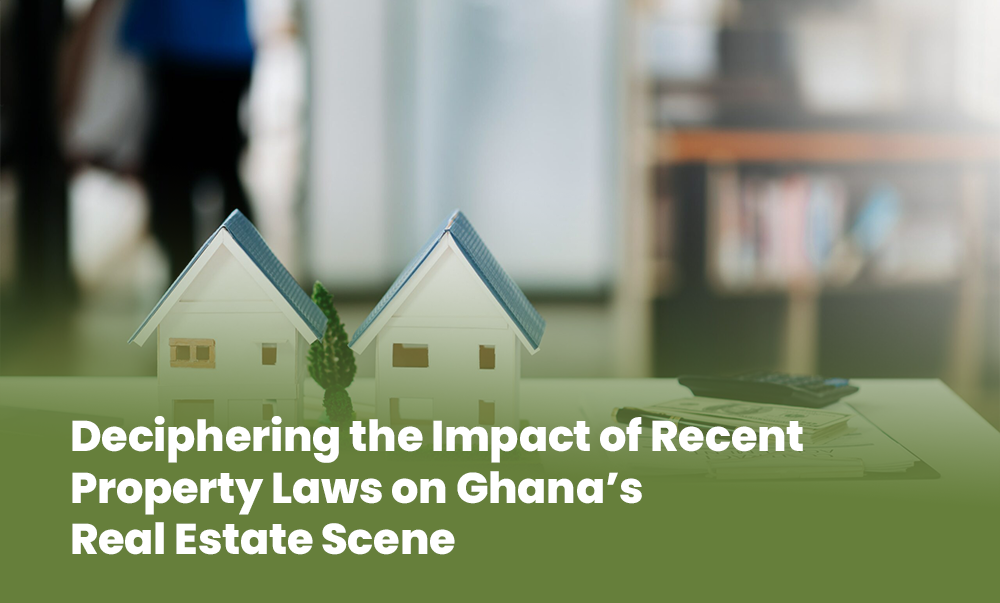Unveiling Ghana’s Real Estate Transformation
Ghana’s real estate realm is undergoing a metamorphosis fueled by recent adjustments in property laws. These alterations have ignited a blend of enthusiasm and apprehension among investors, developers, and property owners. Understanding these fresh laws is pivotal for all involved in Ghana’s real estate arena. This comprehensive guide aims to demystify the repercussions of recent property laws on Ghana’s real estate market, elucidating how these shifts influence diverse stakeholders.
Understanding the New Property Laws: Simplifying Legal Jargon
Ghana’s novel property laws strive to inject more transparency and security into real estate transactions. These encompass a spectrum of aspects, from land ownership rights to lease agreements and property registration procedures. The crux of these changes includes:
Enhanced Land Ownership Rights: New laws offer clearer definitions and safeguards for landowners, ensuring safer transactions.
Refined Lease Agreements: Updates provide more precise guidelines for lease terms, benefiting both landlords and tenants.
Streamlined Registration Procedures: The process for property registration has been streamlined, cutting down on bureaucratic hurdles.
Effects on Property Ownership: Facilitating Transactions
Seamless Acquisition and Transfer
A significant outcome of the new property laws is the streamlined process for acquiring and transferring property ownership. This has bolstered investor confidence and augmented overall market activity. Key benefits entail:
Reduced Legal Complexities: Simplified procedures ensure smoother and quicker property transactions.
Enhanced Market Fluidity: Easier property transfers have rendered the market more dynamic and agile.
Fostering Investor Confidence
The clarity and security afforded by the new laws have attracted more investors to Ghana’s real estate market. This is palpable through:
Heightened Foreign Investment: Improved legal frameworks have positioned Ghana as an enticing destination for foreign investors seeking stable and lucrative opportunities.
Upsurge in Local Investments: Local investors exhibit greater confidence, resulting in larger investments across residential and commercial properties.
Changes in Rental Market Dynamics: Striking a Balance
Fairer Rental Agreements
The rental market in Ghana has witnessed a notable transformation due to the new laws, offering landlords and tenants clearer guidelines on rental agreements. This has led to:
Standardized Lease Terms: New regulations ensure equitable and transparent lease agreements, curbing conflicts.
Enhanced Tenant Protection: Tenants benefit from increased protections, fostering a more balanced rental landscape.
Impact on Rental Prices
With clearer guidelines and more stable relationships, rental prices have adjusted, resulting in:
Heightened Demand: Clearer rental agreements have rendered renting more appealing, stimulating demand.
Stabilized Rent Increases: Clear regulations facilitate more predictable and justifiable rent increases, benefiting both landlords and tenants.
Impact on Real Estate Development: Paving the Path to Compliance
Adapting to Regulations
Real estate developers in Ghana are adjusting to the new laws by prioritizing compliance and risk management. This has engendered a more competitive and innovative real estate market. Key facets include:
Adherence to Regulations: Developers ensure that their projects comply with the new laws, mitigating legal risks.
Embracing Innovation: Compliance drives the integration of innovative designs and construction techniques.
Sustainable Development
The new laws advocate sustainable practices in real estate development, leading to:
Reduced Environmental Footprint: Sustainable practices minimize environmental impact, promoting eco-conscious development.
Heightened Property Values: Eco-friendly buildings command higher market values, attracting environmentally conscious buyers and tenants.
Challenges and Opportunities: Navigating the Terrain
Navigating Legal Changes
While the new laws bring numerous benefits, they also pose challenges. Stakeholders must stay informed and adapt to these changes. Key challenges encompass:
Navigating Complexity: Grasping and adhering to new regulations can be intricate and time-consuming.
Market Adjustment: The market may require time to acclimate to the new laws, causing transient uncertainties.
Leveraging Opportunities
Despite challenges, the evolving property laws present myriad opportunities for growth and innovation in Ghana’s real estate market. Key opportunities entail:
Market Expansion: Improved legal frameworks attract more investors, fostering market growth and heightened competition.
Embracing Technology: Adapting to new laws necessitates the integration of advanced technologies, enhancing operational efficiency and transparency.
Embracing Ghana’s Real Estate Evolution
Ghana’s evolving property laws are reshaping its real estate landscape, offering both challenges and opportunities. By understanding and adapting to these changes, investors, developers, and property owners can navigate the market successfully. The new legal framework promises a more transparent, secure, and dynamic real estate market in Ghana, paving the way for sustained growth and innovation. Understanding and leveraging the impact of these recent property laws is paramount for success in Ghana’s real estate market.


